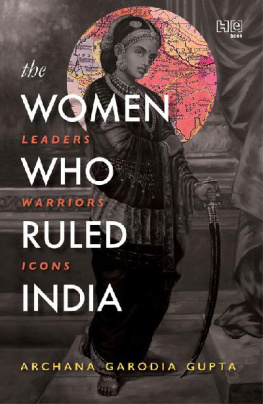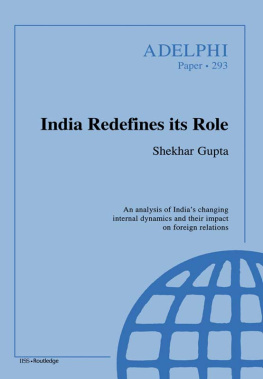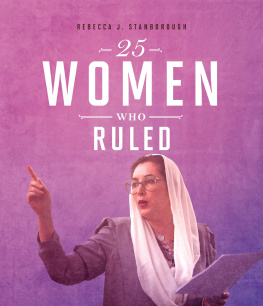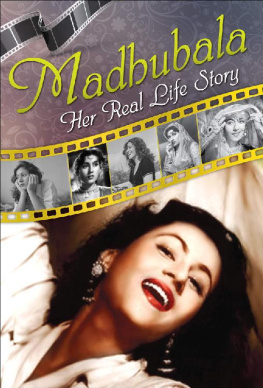the
WOMEN
WHO RULED
INDIA
LEADERS. WARRIORS. ICONS.
ARCHANA AGARODIA AGUPTA A
First published in 2019 by Hachette India
(Registered name: Hachette Book Publishing India Pvt. Ltd)
An Hachette UK company
www.hachetteindia.com
This ebook published in 2019
(Text) Copyright 2019 Archana Garodia Gupta
Archana Garodia Gupta asserts the moral right to be identified as the author of this work.
All rights reserved. No part of the publication may be copied, reproduced, downloaded, stored in a retrieval system, or transmitted in any form or by any means without the prior written permission of the publisher, nor be otherwise circulated in any form of binding or cover or digital format other than that in which it is published and without a similar condition being imposed on the subsequent purchaser.
The views and opinions expressed in this book are the authors own, and the facts are as reported by her and have been verified to the extent possible. The publishers are not in any way liable for the same.
Every effort has been made to trace the copyright holders and obtain permission to reproduce the images used in this book. For those images whose sources we have been unable to trace, we advise the copyright holder to contact us so that we may appropriate credit in future editions.
Paperback edition ISBN 978-93-5195-152-0
Ebook edition ISBN 978-93-5195-153-7
Cover art: Wikimedia Commons/Public domain
Cover design by Sukruti Anah Staneley
Hachette Book Publishing India Pvt. Ltd
4th/5th Floors, Corporate Centre,
Sector 44, Gurugram 122003, India
Originally typeset in Chaparral Pro 11/15.5
by InoSoft Systems, Noida
To my mother, Chandra Garodia, and my father,
Balkrishna Garodia, who never imposed roles
Contents
Women rulers have been few and far between in Indian history, as also in world history but that still leaves hundreds of women who have ruled, and whose stories can be told.
I have selected but a few among them to write about. These women have all ruled independently, either as regents or titled rulers. History is replete with tales of women who influenced their husbands or sons, and have been immensely powerful, but I have included only women who ruled directly, and not through agency, with the sole exception of Nur Jahan.
Some of these women are national heroines, and there are innumerable books and legends about them. Some are lesser known, but are celebrated in the folk memory of their region. Records on many are quite sparse. I have used as many disparate sources as possible: contemporary texts, accounts of foreign travellers as well as secondary sources. I have also used legends and folk tales, which, while difficult to verify, offer nuggets of information and help flesh out the person. It has been quite a task to separate the wheat from the chaff.
These portraits are painted warts and all. They are not hagiographies because these women were not saints. They often made wrong decisions and took on wrong advisors, and sometimes lied and cheated in their quest for power. But they were invariably courageous and intelligent. Above all, they were leaders. We will not hold women leaders up to impossible standards, different from the measures we use for men.
There is a famous (and spectacularly sexist) quote by Samuel Johnson, on the subject of a woman preaching: Sir, a womans preaching is like a dog walking on his hind legs. It is not done well; but you are surprised to find it done at all. Au contraire, these women are worth knowing and writing about not only because they ruled, but also because they ruled well, in any case at levels comparable to male rulers in a particular period. Ahilya Bais Indore, for instance, was considered the best governed state in India in the 18th century.
To those who know their stories it will seem amazing that these women actually became rulers there was no precedent or pathway for them. Women were not given the appropriate education, and their movements and interaction with men was restricted; many were veiled. Even after gaining the throne, they invariably faced stiff resistance internally from their nobles, who could not stomach the thought of being ruled by a woman, and from external rulers, who thought them weak and easy to conquer. Nevertheless, rule they did, with grit and punk.
The women rulers in this book span most of Indias ages and regions. A notable exception is ancient India; while there were many women rulers at the time, there is unfortunately very little information available on them. We know about Prabhavati Gupta, the daughter of Chandragupta II Vikramaditya, who ruled the Vakatakas for 20 years in the fourth century only through a couple of copperplates, and about the Indo-Greek queen Agathocleia who ruled in the second century bce from coins that have been found.
The histories of many more women rulers wait to be told.
Tribhuvanamahadevi has ascended the lion-seat, like Katyayini
Her lotus-like feet are kissed by the heads of feudatory chiefs, bowed down with devoted loyalty,
She resembles the goddess of fortune,
She delights the people with light taxation, resembling the moon that delights the people with soft rays.
She resembles the lotus-tank, appointing officers with clean hands and pure natures like lotuses.
From the Dhenkanal copperplate on Tribhuvana Mahadevi I
The tale of the queens of the Bhaumakara dynasty is a remarkable chapter in Indian history. There are few references to them in ancient works of history or literature, except for a brief mention in an Arabic book on world geography, the Hudud-al-Alam . However, a number of copperplates bearing inscriptions about them have been found during archaeological excavations in Odisha, which have helped reconstruct their fantastic and little-known story. The Bhaumakara dynasty ruled for 200 years, between the eighth and 10th centuries CE , mostly in the region of present-day Odisha, and of the more than eighteen rulers of the region who belonged to the dynasty we know that at least six were women.

The region of Odisha had well-established kingdoms like Kalinga since ancient times, which found mention even in the Mahabharata. In the larger Indian context, it has always been famed for its elephants. The Hudud-al-Alam mentions that extremely large and the tallest elephants in the country were found in the region. These were sent to different Indian states by land and water, as well as exported to Sri Lanka in ships. In fact, Odisha had an interesting relationship with Sri Lanka: according to legend, the founder of the Sinhala kingdom, Vijay Singh, migrated from this region to Sri Lanka in around 500 BCE .
Odisha was fragmented into the smaller, independent kingdoms of Odra, Utkala, Kalinga and Toshali, among others, but at certain points in history, the kingdoms would be united under a powerful king, or briefly become part of a Greater Indian empire, like that of Ashoka or Harsha. Odishas conquest by Ashoka in the third century BCE is immortalized in Buddhist history; tortured by guilt at the death and destruction he had caused, Ashoka went on to promote Buddhism worldwide as a religion of peace and non-violence. For most of its later history Odisha stayed independent, before being conquered by the Mughals in the 16th century.













